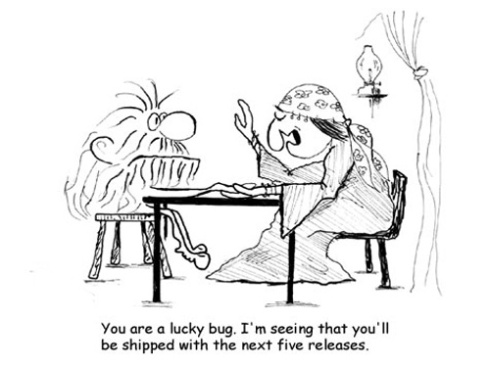Last year’s Quest for Quality conference had a huge impact on me: it was the best conference of 2017 I’ve attended, I spoke there and I was humbled to have my talk evaluated the highest by the audience, I made wonderful connections with which I’m still in touch up to this day, and being there even initiated my move to another country for a new career challenge!
This year, I had the honour to be a part of the programme committee and help choose the talks. What a hard candy that was! Conference’s theme Reinventing QA for the New IT Era was refreshing, yet challenging: there were so many great talks, but looking back at the theme, I could not see some of them being heard at Q4Q. Knowing well myself how much work and effort goes into each tiny abstract, with a heavy heart I rated the talks as objectively as I could with the information I had. The total of a diverse programme committee’s votings was considered, and, I must say, the speaker lineup was pretty impressing: there were quite a few new voices sharing the stage with the experts, and there were even speakers who normally do not speak at testing conferences.
After being in the programme committee, I also got to enjoy the conference as an attendee. I did not think that 2017 year’s experience I had at Q4Q could be challenged, but I believe it was. Both years Q4Q was in Dublin, and I just fell in love with the atmosphere there, what to even say about the inspiring thoughts I heard at the conference, and wonderful people I met again. After the conference, I was just smiling from ear to ear with the new ideas buzzing in my head.
To give you a glimpse of what kind of an experience Quest for Quality conference is, I’ll touch on the 3 key areas where Q4Q2018 excelled: organisation, content & people.
Organisation
Quest for Quality wins hearts with a welcoming atmosphere: many nationalities attending, speaking, and even organising this event. This diversity definitely speaks up to many and makes people feel included. While Dublin is an absolute gem of a city in itself, the beautiful Marker’s hotel as a venue was a lovely addition.
The organisers are very kind and helpful people as well: always there for you, looking for feedback – I still smile remembering one of the main organisers Nikola turning to me to see what I thought of the talks or the event in general. It is important to be with an open heart and willingness to improve.
With all this, even the usually scary filming crew was not that scary at all. The friendly Andjelina was taking interviews and really making sure everyone feels comfortable. She was so kind that even not knowing me much after hearing that I’m coming to Belgrade – she invited me to meet up for a coffee. It still is rather weird for me to see myself in a video testimonial on the conference, but I am sure that it helped a lot to have such good support.
Content
After attending many testing conferences, content for me became one of the very top priorities. Presentation skills matter, of course, but if there is no useful content – what is there from that! I am happy that Quest for Quality met my expectations and differently than some other conferences I attended, it included some topics which were not just testing related – that helped us learn something new, broaden our minds, and just get inspired.
Here are some of the talks that really left an impression on me.
Anna Royzman from Global Quality Leadership Institute delivered a keynote “Test Leadership of the Future: New Challenges, Big Opportunities“. She spoke of challenges we are facing right now, how important it is to be a quality leader, and how our role may actually change. I really enjoyed this talk – I ended up writing down 2 pages of notes. One of the key takeaways I took was how being yourself is powerful: you can help others learn, so you have to embrace that. Also, her 8 principles of modern quality leader are just something that speaks very much to me. It’s important to share knowledge and speak up in order to inspire and coach others.
Davar Ardalan from IVOW told us about “Storytelling in the Age of Robots and Artificial Intelligence”. IVOW is a storytelling agency that wants to create a deeply inclusive AI. Very often when talking about AI we forget the human aspect of that: what about the culture? Wouldn’t it be great to have an AI that can help us recognise cultural events and stories? Or an AI telling us stories about our ancestors? I loved the idea that we have to work on making AI be inclusive and have the context of culture. Also, Davar’s storytelling skills are just wonderful – she has worked at NPR, so hearing her speak alone is quite an experience, what to even mention about such a content.
The closing keynote by Fabian Dittrich from Helpando “Agile living and the future of work: What I learned as the CEO of a nomadic company” was very refreshing and inspiring. Fabian quit his job and decided to work while traveling the world. He shared all the adventures he had and what it taught him. From productivity tools to the fact that it matters more than anything to live a life that you love.
People
One word: wow. Crazy, beautiful, smart, inspiring, charming people at Quest for Quality. Just to name a few extra things apart from constant networking at the conference: breathtaking discussions on security testing the night prior to the event with Milan and Amela, spontaneous pub crawl in Dublin after the networking event with the most fun people (Stuart – I absolutely adore him, highly recommend to follow him – great things will come out (and some already did like him being featured in The Guilty Tester podcast or his new TestingBants podcast); Lewis; Saga; Pieter; Jarl – you are simply treasures), inclusion talks during breakfast with Niranjani and Gabrijela…
So many topics close to my heart were discussed: testing, culture, machine learning, communication, diversity & inclusion. In Quest for Quality networking goes so smoothly, maybe it’s because it’s such a family-like atmosphere. As for me people is the number one thing that inspires me – this conference was just breathtaking with amazing new friends I gained.
A blurry memory from the wonderful Long Hall during the pub crawl ❤
So, Quest for Quality did it again… With amazing organisation, people & content it yet again was one of the highlights of my year. People matter a lot to me and it is a conference which allows you to meet so many amazing people and learn a lot as well. What could be better! I left the building admiring the skies of Dublin and the neighbourhood with a huge smile on my face – thank you, Q4Q!




